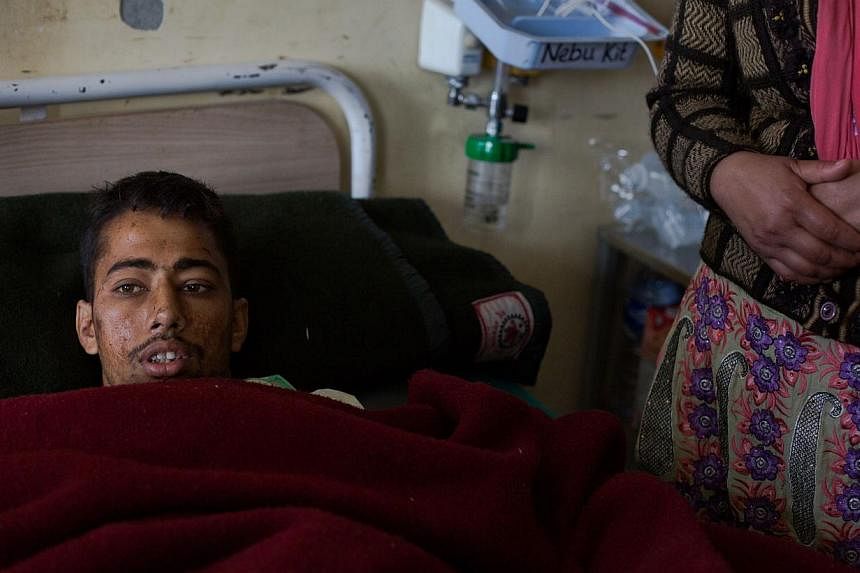KATHMANDU (REUTERS) - Nepali farmer Rishi Ram Khanal was looking forward to leaving Nepal for Dubai, where a US$220-a-month job as a cleaner at a Kentucky Fried Chicken restaurant promised him the chance to pull his young family out of a life of poverty.
Those hopes were dashed on Saturday when the 7.8 magnitude quake struck.
Khanal found himself buried under the debris of a five-storey Kathmandu guest house, pinned to the ground by fallen rubble and forced to drink his own urine, as he shouted for help and waited for more than three days to be rescued.
Thousands were killed when the earthquake brought down buildings and triggered avalanches and landslides. Khanal, 26, was rescued after being buried for about 80 hours.
But on Thursday, as he recuperated at Tribhuvan University's teaching hospital after doctors amputated his leg, Khanal said it would have been better if had died. "What will I do for the rest of my life? My chance to work in Dubai is gone and I cannot even work as a farmer," Khanal said in an interview from his hospital bed. "I don't even have the money to buy a wheelchair now. How will I spend the rest of life and support my family?" As rescue crews dug through the rubble and hopes of finding more people alive faded, millions of survivors of Nepal's worst disaster in 81 years are faced with the same question. They have to deal with the loss of friends and family and rebuild their lives in a poor and devastated country.
The United Nations has said up to eight million people have had their lives disrupted by the earthquake and said there was an urgent need for relief materials ranging from tarpaulin sheets and clean water to soap and medicines.
Pinned by Debris
Khanal arrived in Kathmandu last Wednesday from DhakaBang, a village in the western hills of Nepal.
He had left his wife and six-month-old son back at their mud-and-stone home in the village, borrowed US$1,100 from local moneylenders on 24 per cent interest and had finalised travel arrangements. He was to board his first international flight on Monday.
He was confident that the job in Dubai, which also came with food and accommodation, would pay him enough to be debt-free in six months.
All he had to do was wait. On Saturday, he returned to the guest house, where he was staying with three others, on the outskirts of the capital after lunch and was contemplating going out for a stroll.
Then, just before noon, the quake struck. In an interview from the hospital bed, Khanal said he fell to the floor and within seconds the beams and the roof of the room fell. He was pinned to the ground. "I kept shouting for help, but for three days I heard no sound and had no indication of anyone around me," Khanal said.
Shouting for help
Unable to move but keen to keep up his strength, Khanal said he took out the handkerchief from his pocket, soaked it with his own urine and squeezed it in his mouth. "It gave me some energy to shout, and I survived," Khanal said.
On Tuesday evening, he said he heard drilling noise from above.
Khanal was finally rescued after more than seven hours of drilling into the rubble by a French and Nepali rescue team, was rushed to the hospital with a severed leg. His three friends died in the quake.
On Thursday, after spending a night in intensive care, Khanal was in the general ward of the hospital, where some 20 other people were recuperating. His face, neck and arms were bruised, and blood clots were visible on his face. His lower body was covered with a blanket, and he had two packs of biscuits next to him on a table.
Doctors had told him they could save his leg. Doctors at the hospital said his condition was stable.
Khanal said he remained in a state of shock.

